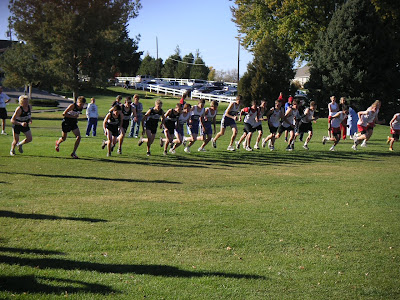What makes you strong? Is it the hours of training you put in day after day, the number of squats and push-ups you can do, how hard you can push yourself in an interval, the roadblocks and tough times you encounter throughout your athletic career…?
All of them! If you ask any athlete what makes them strong, I’m sure they would agree that all of those things build you up as an athlete and as an individual. I have learned, through my own personal experience, the impact and importance of experiencing tough times during ones athletic career.
When asked to reflect upon my own roadblock, I was immediately reminded of my senior year at UAA in 2006. After coming off a stellar year of racing and ending my 2005 season with a 2nd place finish at NCAA’s, I entered the 2006 racing season with results in the 90’s at U.S. Nationals, the worst I had ever finished by far! “What is wrong with me?” That was the first question that came to my mind. “Am I physically out of shape, mentally out of racing, did I do the wrong training?” All these questions swarmed my mind as I struggled to figure out why I was performing so badly. I decided that I had to put my mental thoughts to the test. I went into the next race 110 percent, ready to push my body to its limit. After racing as hard as I could, I finished the race with my worst placing ever in a colligate race; I ended up 23rd, even after putting in my best effort. I was absolutely distraught and frustrated! Here I was in my senior year, captain of the ski team, feeling the high expectations from myself, coaches and peers to perform as well as I did the year before and I was dead last on the team. I had no excuse or answer as to why I was performing the way I was.
As soon as I got back home, blood tests were performed and soon after, I found out that my iron levels were very low. I was clinically diagnosed as anemic. I had a sense of relief after discovering that there actually was a physiological reason behind my sub-par performances, but I immediately wondered what it was going to take to get me back to where I was racing before. I was informed that there is no "quick-fix" for anemia. It takes three full months for iron stores to return to their full carrying capacity. I figured that if I could at least double the iron level I was currently at by the time NCAA’s rolled around, then I would feel twice as good. Right?
I spent the next couple months taking a substantial amount of iron supplements and was very conscientious of my food intake. The results from the races leading up to NCAA’s were nothing great, but I kept a good, positive head on my shoulders and kept striving for my goal…to get top 10 at NCAA’s.
When NCAA’s finally arrived in March in Steamboat Colorado, I was ready to go! This was it! My classic result wasn’t anything to brag about but I was happy with my performance. I finished just shy of top-10 in the skate race, but I was satisfied because I knew that I had pushed myself as hard as I could.
Whoa! I was filled with relief after the last race of the season. It was finally over! Despite my results, I finished the year knowing that I had tried my best and strangely enough, stronger. I learned the importance of patience, humility and keeping a positive attitude. I don’t ever wish to be in that situation again, but I must admit that I don’t regret what it taught me. I grew as an athlete and as an individual during that time and I did not let it stop be from pursuing my long-term goal of training for the 2010 Olympics…that is where I am today. Since then, each year has been a steady improvement. I remind myself of where I started from and how far I have come. Whenever I encounter a rough spot in my training or in my ski career, I am reminded of the importance of patience and the importance of keeping a positive attitude. With these two qualities, any athlete will only grow stronger and stronger.
 Bronwen and Morgan leading the pack.
Bronwen and Morgan leading the pack. The Cutthroats number 1 runner, Sam, on the final stretch.
The Cutthroats number 1 runner, Sam, on the final stretch.

